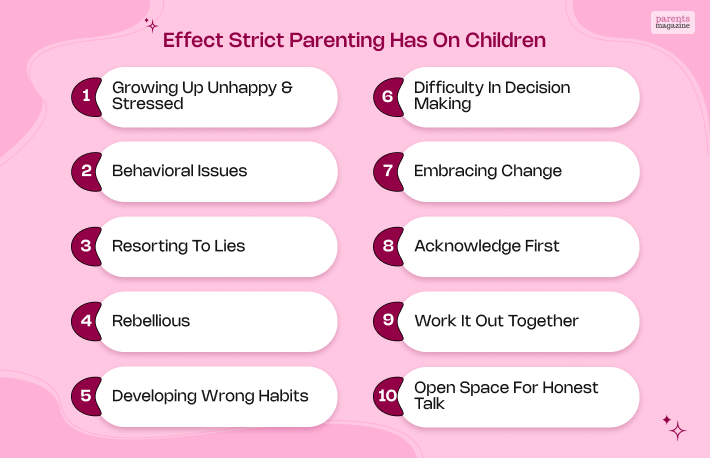
Am I A Strict Parent? Common Signs Strict Parents Share
If your neighbor had to point it out to you, then, possibly, you are being a bit strict with your child. Strict parents have a few things in common. They have a certain set of rules and a peak point of expectation that children often fail to measure up to. This leads to them being even stricter.
Have you ever sat down to ask yourself, “am I being a strict parent?” If you have, then we have a lot to discuss.
Are you worrying that you are raising your expectations to certain unreachable limits? Are you worrying that you are setting rules that make your child feel claustrophobic and restricted? If such questions concern you, then here is help.
10 Signs Strict Parents Have In Common

Children raised by strict parents start hiding their mistakes and failures from their children. They are afraid of the consequences of getting caught. So they start hiding. But how do you find that you are strict with your kids? Here are some signs common among kids.
1. A Zero Tolerance Policy
“Can’t you follow one word I say? Are you dumb?”
Instead of clutching the rear brake, your son pressed the break of the front wheel during his driving lessons with you. Did that make you mad? Did you lose your calm and composure just because he hit the wrong brake?
No, he did not do anything to ruin your reputation. If you keep adhering to the rules always, you will always remain rigid and strict. Tolerate a little. Understand your kids’ behaviors and evaluate them. Constant strictness and zero tolerance will only reduce your kid’s willingness to express and share things with you.
2. Your Child Has To Lie To You

“Strict parents raise the best liars – Kudos.”
Why do you think your son had to lie to you about being out so late? Even you know that he wasn’t doing the joint study. He was at Rob’s birthday party. Wait, you don’t let your kid go to his friend’s birthday party? If you don’t want to raise a good liar, do not keep a closed ceiling above all of their activities. Be a little less restrictive and let them set their own limits and learn to be accountable.
3. You Choose What They Wear

“I don’t expect my daughter/son to dress like that.”
Even after I was eighteen, I had to wear clothes my father chose for me. When I started living independently, I started wearing whatever I wanted. One day, when he visited my place, he started questioning me about the torn jeans I had lying around my room.
4. They Don’t Stay Out Late At Night

“You’ll be home by 9:00, not a minute later. Is that clear?
Strict parents don’t let their children stay out late at night. Yes, they have good intentions and good reasons for this. But why do some of them lock their children out for staying out late? I remember my friend asking me to crash at my place many nights.
5. You Blame Their Favorite Activity For Their Failure
“From now on, no video games.”
Strict parents choose hobbies for their children. Have you ever locked up your kid just because he was spending hours on PS5 or playing with a skateboard? Did a bad grade card make you break their guitar or skateboard or burn the sketchbook they keep with them all the time? You also complain about your child having the wrong hobby.
You were great at basketball, but all your son loves to do is play piano; you feel that it is such a shame on your family.
6. Anything Is Unacceptable
“This is unacceptable.”
When your son comes home with their hair dyed purple, you cannot stand it – as if they have put color on your reputation, which should have stayed white. Strict parents usually cannot accept both small and big decisions their children take on their behalf. You cannot accept their open expression, dress, behavior, or representation of themselves.
7. You Nag Constantly
“Do your homework; now.”
If you want your children to be responsible for their work, stop nagging. Strict parents habitually stick a ticking clock on their children’s faces. They keep nagging about when to finish their homework, when to eat, when to go to bed, and more. It is important to let them have control of their daily actions.
8. You Give Directions All The Time
“Quit dragging your feet.”
Strict parents want to control all their kids’ actions and movements. They want their children to “sit up straight,” “not slurp their drink,” and eat what you put on their plate. A parent must give directions. But you should save them for more important reasons where they are needed.
9. Your Way Is The Right Way
“Let me show you how it’s done.”
Even if it works for the children, strict parents don’t accept the way their children do something. Strict parents always want children to do things correctly or appropriately.
10. You Don’t Praise The Effort But The Outcome
“You should have studied harder.”
When was the last time you praised your child for working too hard to crack a certain test? Strict parents only praise the outcomes. Even though our life is full of events, moments of success are hard to come by. This creates a lack of praise from strict parents. Your children start to think that you love them on conditions.
Effect Strict Parenting Has on Children

Parents want to do everything right. Then, they transition into thinking they are always right. They base their love and caring on the academic performance of the child. Setting an academic parameter for a child and expecting them to fulfill them is one of the manipulative things some parents do.
Of course, it’s in their best interests. But the results aren’t always the best. It can often damage the children mentally and can have several negative effects on them as well.
Growing Up Unhappy & Stressed
There have been studies that show that children who are raised in their house strictly are prone to have symptoms of depression and are unhappy in their lives. In countries like Australia and Hong Kong, it is seen that kids show suicidal tendencies who are brought up in strict households.
Suffering from anxiety disorders and depression are common among children who were brought up in a family with strict parents.
Behavioral Issues
It is a common notion of parents that if they are being strict with their kids, that will teach them better behavior, but it is actually the opposite. They often develop behavioral issues. It is something very common that kids learn what they see.
So, the way they are taught is something they learn, and they react the same way when they are upset about something. They become more rebellious, impulsive, aggressive, and angry when things don’t turn out their way.
Resorting to Lies
Being strict might turn things the wrong way. Strict parents want their children to obey them and respect them, and they want to get that through intimidation. But guess what? This will turn the kids into liars in the future. They learn to get their way without informing their parents. Moreover, they start to hide things, they behave sneaky, and they learn to act in front of their parents.
Rebellious
Strict parents have a way of deciding everything for their children without even asking them if they are interested in that at all. They decide their extracurricular activities – which social events they will attend and which they will not. But this causes a lack of motivation in them. What a parent thinks would benefit a child might not interest them as much. In addition, they might even get rebellious.
Developing Wrong Habits
Being overly strict and using fear as a force might turn them into bullies. They are well known for their power and force. They know how it affects them and might want to practice that on other kids associated with them.
Difficulty in Decision Making
Studies show that female adolescents who have been raised with authoritarian parents lack the ability to decisions making when an opportunity appears in front of them. They are always told what they have to do. So, they lack self-confidence and self-esteem. Moreover, they constantly worry about making the wrong choice or making the wrong decision.
Embracing Change: Becoming a Permissive Parent
Parenting is like trying to crack a wall with your fist while holding an egg inside your clutch. It’s difficult. You have to reprimand them. But you also can’t compromise on loving them unconditionally.
What’s the solution, then? Here are a few things to keep in mind –
Acknowledge First
As a parent, you’re supposed to build an environment where your child can build their emotions, social bonds, and technical skills. Most importantly, they should be fearless of self-expression and be able to express their opinions.
So, you can’t resort to strictness all the time. The first stage is to recognize your strictness. Next, look for behaviors that you think are strict. It can be yelling at them or choosing extreme ways of punishing your kids when they are being disobedient.
Work it Out Together.
Build an environment where your child respects the rules but also has an option to negotiate their terms. Stop resorting to yelling and screaming. Instead, build structures and rules that your child feels comfortable to follow.
In addition, they should also have a place to speak for themselves. This way, you will work it out and see what works best for your child’s mental health and your place as a parent. You can build reasoning for the rules. Praise your child when they are following them instead of punishing them when they break it.
Open Space for Honest Talk
Home is a place where everyone can let their guard down. It goes for you and your child. Learn to address mistakes objectively. Instead of criticizing your child, criticize their mistakes.
Also, we are talking about an open space for honest talks, so listen to your child and listen attentively. Parenting is often about letting go of the steering wheel and holding the car from falling off the edge of a cliff. That’s what you do when you listen actively. Let your child express what they feel and help them work it out.
Bottom Line
Even strict parents must understand that they are raising someone who will become a full-fledged human being. It would not be possible if parents were always restrictive, directive, controlling, unforgiving, and choosy about their children’s actions. If you are having doubts about being harsh on your children, this article should shed some light on your thoughts.
I hope that this article was helpful. However, if you have any further queries, you can reach out to us in the comment section. We will reach out to you as soon as possible.
Read Also:
Already have an account?
Sign In
Create your account
User added successfully. Log in









